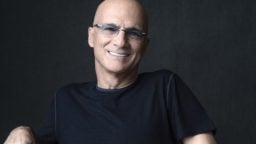Sony Music Entertainment CEO & Chairman Doug Morris, 76, is one of the most influential corporate figures in the entire entertainment industry.
Yet despite all of this market power, he remains a music man through and through.
This was self-evident during a rare Q&A with the exec at Midem on Sunday (June 7), in which he discussed his 50-year history in the business, including his beginnings as a songwriter and his first job at Leeds Music, who paid him just $25 a week.
Morris has done rather well since those early days, of course – including highly successful spells at the helm of Atlantic Records, Warner Music and Universal Music, which he presided over from 1995 to 2011.
(And as boss of Sony, of course – with rumours that he’s just negotiated a fresh contract for another two years.)
Read below for some of Morris’s finest quotes from the Midem Q&A – hosted by Rupert Younger, director of the Oxford University Centre for Corporate Reputation.
Or, by all means, watch the full video interview. It’s worth your time.
Doug On… Jimmy Iovine
“I wanted someone to produce Stevie [Nicks’ solo album Bella Donna in 1981], and Jimmy was emerging as a great young producer. He had produced Tom Petty and worked with John Lennon, Bruce Springsteen – he was on an arc to greatness.
“I called him and said, ‘I want you to produce this Stevie Nicks solo album’ and he said, ‘I’d rather produce The Rolling Stones.’
“I said, ‘I understand you would, so would I! But you’re gonna produce Stevie Nicks.’
“He went out there and produced her solo record.
“I was very good friends with Stevie, so I called her up after the first two weeks at her house to find out how she was doing, and Jimmy answered the phone. ‘Hey Jimmy, can I talk to Stevie?’ ‘She’s sleeping.’ I said: ‘Ah. What are you doing there?’
“That’s when I realised that when you work with Jimmy, you’ve got to be ready that he’s always gonna get a little something extra.”
“Jimmy’s an extrordinary person… He’s really a product of his dad. If Jimmy would get up in the morning and make an omelette, his dad would come in and say, ‘That’s the best omelette I’ve ever seen. No-one can make an omelette like Jimmy.’
“If Jimmy would say to his dad, ‘Can you believe I’m going to work with John Lennon tomorrow?’ You know what his dad said? ‘Lucky John!”
“When you’ve got someone like that behind you, a mentor like that, it gives you the confidence to go out and destroy the world. That’s what Jimmy has – enormous talent, intellect and a great belief in his own ability.”
“Jimmy and I have stayed friends for 37 years. I speak to him at least twice a day. He is the most remarkable person.”
doug ON… signing gangsta rap and suge knight
“At first I was taken aback by the lyrics and the misogyny of rap music, then I saw all of these little independent record companies buying and selling it.
“Being a big advocate of the first amendment, I started signing rap artists. The first one I signed was 2Live Crew, which I got in a lot of trouble for – they actually got arrested in Miami for selling their music. We convinced Bruce Springsteen to let us turn Born In The USA into Banned In The USA.
“One day Jimmy [Iovine], who almost has an ability to see round corners, called me up and said: ‘This stuff is going mainstream, we really have to get into it… I’ve met this guy, I want you to come out and meet him with me. His name is Suge Knight.’
“We met Suge Knight in a fancy resturant in California, The Ivy, for lunch. He was a former gangbanger out of Compton, a member of the Bloods. When I met him, I thought: ‘This guy has the biggest chest I’ve ever seen!’
“After everything else is said and done, [Knight] was a brilliant, brilliant record executive. He had this label, Death Row – I wasn’t crazy about the name – and the symbol was a guy being strapped into an electric chair.
“It was sort of out of our culture. Jimmy weighs about 120lbs, Suge weighs about 280lbs. They were sitting next to each other and I found it very funny.
“Jimmy said to me: ‘Listen, when I wink at you, it means I’m going to the bathroom. And I want you to tell Suge that I’m a genius.’
“Because of that, what’s going to happen?
“‘We’re going to sign Death Row Records.'”
“So Jimmy goes off the bathroom and I’m sitting over the way from Suge. I say: ‘You know, you’re very fortunate.’ ‘Why?’ ‘You’re going to have the chance to work with a genius.’
“Finally, Jimmy comes back and, belive it or not, we made that deal.
“Interscope picked up the distribution for Death Row Records – including Dr. Dre, Snoop Dogg and a myriad of iconic rap artists.”
Doug On… How to run a company properly
“It may sound square, but my whole philosophy of running a company can be put in two words: Be nice.
“Treat people with respect. Make the people working for you feel great, make them know you appreciate what they do.
“I remember when I was coming up people would degrade you, make you feel bad, send you home at night worried about your job.
“There was one guy who used to say, ‘I want to see you on Monday, I have something to talk to you about,’ and you knew it was something bad and you worried about it all weekend. Those are cruel people and I don’t like to be involved with them.
“Our companies are based on mutual respect and loyalty to each other. And that works — when you really mean it, the people who work with you know it, and when they do something special you pay them a little extra.
“People going out that door at night are your most important asset. That’s the culture I believe in.
“I hate screamers, I hate people who abuse other people. At our companies — the ones I’ve been in charge of – that’s not tolerated.”
DOUG On… ahmet ertegun and hits, hits, hits
“Ahmet was one of the most interesting people in the history of the industry. Atlantic Records was a cool company.
“But he was also a bon vivant, and he loved to have a good time. Let me say it again: He loved to have a good time.
“Anything you read about him, multiply it by two.
“I’ll give you an example of our relationship: every morning, we’d come in there’d be a big high five and a hug. What a way to work!
“I remember one night, a bit of a dandy, he came to my office about 6 o’clock – he had on this beautiful tan suit, white shirt, green tie…
“He said: ‘We have a little bit of a problem. Steve Ross, the big boss of Warner Communications, wants us up in his office at 9am tomorrow.The board are going to be there and they want a discussion about our strategy and tactics – how we’ll improve next year.’
“I said: ‘Oh boy.’ Ahmet said: ‘Don’t worry, I’ll take care of the whole thing. Just be there by 9am.’
“A sense of anxiety went through me. I was there at 9am, and there was no Ahmet. At 9.15am, there was no Ahmet.
“At 9.20am, there was Ahmet, wearing that same tan suit. Except he had a huge stain where he must have dropped a drink on his lapel and it had gone all the way down his pants.
“He had on these dark glasses. By the way, there is no yeast in any of these stories. This is really true.
“I thought we were going to lose our jobs. Ahmet came in and sat down, and the entire board of directors were sat along this enormously long table.
“Steve Ross spoke: ‘Mr Morris, Mr. Ertegun, we’re here to hear your plans. What is your strategy to improve your business next year?’
“So help me, Ahmet looked up and said: ‘Doug and I are going to get more hits. That’s it.’
“There was a lot of shuffling of papers. They were mortified. Finally Steve said: ‘Thank you very much.’
“We walked out and I said: ‘You’re bat shit crazy!’
“The story ended the next year. We got a lot more hits.
“That really is the record business.”
doug ON… Steve jobs and the birth of itunes
“Did Steve Jobs understand the music industry? He certainly understood it well enough to sell millions of devices. That’s pretty smart.
“The first time I met him he came to my office. He had signed a deal with EMI to use their music on iTunes. But Universal was the biggest [music] company and he desperately needed that music to really start his business.
“He laid out a programme to me – from iTunes to the iPod – and I was so taken to him, I was shocked. He was so articulate.
“The people in my company were really against leasing him the music because they thought it would open up the album. Well they were right. The problem was that it had already been opened up by the internet. Everything was being stolen.
“This guy showed us a way to make money with digital music.
“In the record business, we spent tens of millions of dollars trying to create a digital system to sell music. None of them ever worked. We had one thing at Universal… no-one ever got it to work.
“Steve did it with such grace and class. It was amazing.”Music Business Worldwide




